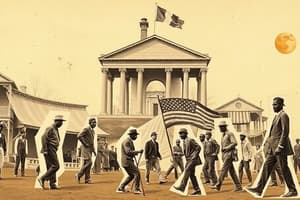Podcast
Questions and Answers
The compromise of 1820 averted sectional conflict by:
The compromise of 1820 averted sectional conflict by:
- Implementing a more stringent fugitive slave law
- Lowering tariff rates
- Preserving the balance of power between free and slave states (correct)
- Eliminating the constitutional ban on the importation of slaves
- Removing federal troops from the south
All of the following relate to the McCarthy era EXCEPT:
All of the following relate to the McCarthy era EXCEPT:
- Federal loyalty program
- Palmer raids (correct)
- Alger Hiss trial
- Hollywood Ten
- McCarran Act
Samuel Gompers:
Samuel Gompers:
- Used the state militia to break up the Boston police strike
- Advocated socialism as head of the Industrial Workers of the World
- Directed President Franklin D. Roosevelt's War Labor Board
- Led the American Federation of Labor (correct)
- Was a Populist candidate for governor in Kansas
During the Second New Deal, President Franklin D. Roosevelt:
During the Second New Deal, President Franklin D. Roosevelt:
Flashcards are hidden until you start studying
Study Notes
Compromise of 1820
- Preserved the balance of power between free and slave states by admitting Maine as a free state and Missouri as a slave state.
- Established the 36°30' line to demarcate free and slave territories in the Louisiana Purchase.
McCarthy Era
- The Palmer Raids, unrelated to McCarthyism, aimed to eliminate radical leftist and anarchist influences after WWI.
- Key elements of McCarthyism include the Alger Hiss trial, the McCarran Act, the federal loyalty program, and the Hollywood Ten.
Samuel Gompers
- Led the American Federation of Labor, focusing on trade unionism and workers' rights.
Second New Deal
- President Franklin D. Roosevelt focused on passing long-lasting reform measures, such as the Social Security Act and the Fair Labor Standards Act.
- The First New Deal emphasized recovery and relief, while the Second New Deal aimed for more significant social reforms.
John Peter Zenger Trial (1735)
- Contributed to the establishment of freedom of the press as Zenger criticized New York's royal governor, William Crosby.
Vietnamization
- The policy of Vietnamization, which aimed at reducing American involvement in the Vietnam War, took place under President Richard M. Nixon.
Wilmot Proviso
- Proposed to ban the importation of slaves into territories acquired from Mexico, heightening sectional tensions over slavery.
Harvard College
- Founded primarily to train Puritan ministers, reflecting the religious and educational priorities of the time.
Rosenberg Case
- Exemplified the anti-communist hysteria of the 1950s, as Ethel and Julius Rosenberg were convicted of espionage for allegedly aiding the Soviet Union and executed in 1953.
"The Jungle"
- Written by Upton Sinclair, the novel highlighted unsanitary conditions in Chicago's meatpacking industry and spurred reforms in food safety regulations.
Studying That Suits You
Use AI to generate personalized quizzes and flashcards to suit your learning preferences.




